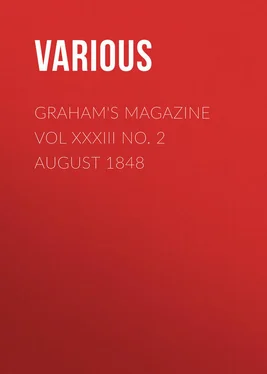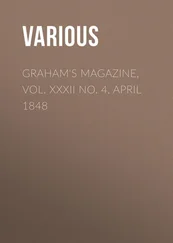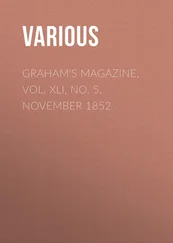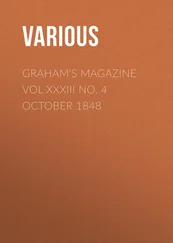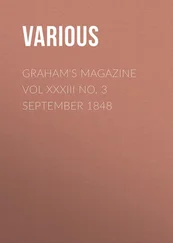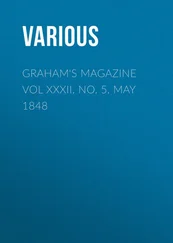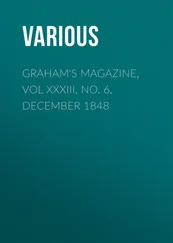Various - Graham's Magazine Vol XXXIII No. 2 August 1848
Здесь есть возможность читать онлайн «Various - Graham's Magazine Vol XXXIII No. 2 August 1848» — ознакомительный отрывок электронной книги совершенно бесплатно, а после прочтения отрывка купить полную версию. В некоторых случаях можно слушать аудио, скачать через торрент в формате fb2 и присутствует краткое содержание. Издательство: Иностранный паблик, Жанр: periodic, literature_19, foreign_edu, на английском языке. Описание произведения, (предисловие) а так же отзывы посетителей доступны на портале библиотеки ЛибКат.
- Название:Graham's Magazine Vol XXXIII No. 2 August 1848
- Автор:
- Издательство:Иностранный паблик
- Жанр:
- Год:неизвестен
- ISBN:нет данных
- Рейтинг книги:5 / 5. Голосов: 1
-
Избранное:Добавить в избранное
- Отзывы:
-
Ваша оценка:
- 100
- 1
- 2
- 3
- 4
- 5
Graham's Magazine Vol XXXIII No. 2 August 1848: краткое содержание, описание и аннотация
Предлагаем к чтению аннотацию, описание, краткое содержание или предисловие (зависит от того, что написал сам автор книги «Graham's Magazine Vol XXXIII No. 2 August 1848»). Если вы не нашли необходимую информацию о книге — напишите в комментариях, мы постараемся отыскать её.
Graham's Magazine Vol XXXIII No. 2 August 1848 — читать онлайн ознакомительный отрывок
Ниже представлен текст книги, разбитый по страницам. Система сохранения места последней прочитанной страницы, позволяет с удобством читать онлайн бесплатно книгу «Graham's Magazine Vol XXXIII No. 2 August 1848», без необходимости каждый раз заново искать на чём Вы остановились. Поставьте закладку, и сможете в любой момент перейти на страницу, на которой закончили чтение.
Интервал:
Закладка:
With unassured yet graceful step advancing,
The light vermilion of her cheek more warm
For doubtful modesty; while all were glancing
Over the strange attire that well became such form
To lend her space the admiring band gave way;
The sandals on her silvery feet were blue;
Of saffron tint her robe, as when young day
Spreads softly o'er the heavens, and tints the trembling dew.
Light was that robe as mist; and not a gem
Or ornament impedes its wavy fold,
Long and profuse; save that, above its hem,
'Twas broidered with pomegranate-wreath, in gold.
And, by a silken cincture, broad and blue,
In shapely guise about the waste confined,
Blent with the curls that, of a lighter hue,
Half floated, waving in their length behind;
The other half, in braided tresses twined,
Was decked with rose of pearls, and sapphires azure too,
Arranged with curious skill to imitate
The sweet acacia's blossoms; just as live
And droop those tender flowers in natural state;
And so the trembling gems seemed sensitive,
And pendent, sometimes touch her neck; and there
Seemed shrinking from its softness as alive.
And round her arms, flour-white and round and fair,
Slight bandelets were twined of colors five,
Like little rainbows seemly on those arms;
None of that court had seen the like before,
Soft, fragrant, bright – so much like heaven her charms,
It scarce could seem idolatry to adore.
He who beheld her hand forgot her face;
Yet in that face was all beside forgot;
And he who, as she went, beheld her pace,
And locks profuse, had said, "nay, turn thee not."
Idaspes, the Medean vizier, or prime minister, has reflected on the maiden's story, and is alarmed for the safety of his youthful sovereign, who consents to some delay and experiment, but will not be dissuaded from his design until five inmates of his palace have fallen dead in the captive's apartment. The last of these is Altheëtor, a favorite of the king, (whose Greek name is intended to express his qualities,) and the circumstances of his death, and the consequent grief of Egla and despair of Zophiël, are painted with a beauty, power and passion scarcely surpassed.
Touching his golden harp to prelude sweet,
Entered the youth, so pensive, pale, and fair;
Advanced respectful to the virgin's feet,
And, lowly bending down, made tuneful parlance there.
Like perfume, soft his gentle accents rose,
And sweetly thrilled the gilded roof along;
His warm, devoted soul no terror knows,
And truth and love lend fervor to his song.
She hides her face upon her couch, that there
She may not see him die. No groan – she springs
Frantic between a hope-beam and despair,
And twines her long hair round him as he sings.
Then thus: "O! being, who unseen but near,
Art hovering now, behold and pity me!
For love, hope, beauty, music – all that's dear,
Look, look on me, and spare my agony!
Spirit! in mercy make not me the cause,
The hateful cause, of this kind being's death!
In pity kill me first! He lives – he draws —
Thou wilt not blast? – he draws his harmless breath!"
Still lives Altheëtor; still unguarded strays
One hand o'er his fallen lyre; but all his soul
Is lost – given up. He fain would turn to gaze,
But cannot turn, so twined. Now all that stole
Through every vein, and thrilled each separate nerve,
Himself could not have told – all wound and clasped
In her white arms and hair. Ah! can they serve
To save him? "What a sea of sweets!" he gasped,
But 'twas delight: sound, fragrance, all were breathing.
Still swelled the transport: "Let me look and thank:"
He sighed (celestial smiles his lips enwreathing,)
"I die – but ask no more," he said, and sank;
Still by her arms supported – lower – lower —
As by soft sleep oppressed; so calm, so fair,
He rested on the purple tapestried floor,
It seemed an angel lay reposing there.
And Zophiël exclaims,
"He died of love, or the o'er-perfect joy
Of being pitied – prayed for – pressed by thee.
O! for the fate of that devoted boy
I'd sell my birthright to eternity.
I'm not the cause of this thy last distress.
Nay! look upon thy spirit ere he flies!
Look on me once, and learn to hate me less!"
He said; and tears fell fast from his immortal eyes.
Beloved and admired at first, Egla becomes an object of hatred and fear; for Zophiël being invisible to others her story is discredited, and she is suspected of murdering by some baleful art all who have died in her presence. She is, however, sent safely to her home, and lives, as usual, in retirement with her parents. The visits of Zophiël are now unimpeded. He instructs the young Jewess in music and poetry; his admiration and affection grow with the hours; and he exerts his immortal energies to preserve her from the least pain or sorrow, but selfishly confines her as much as possible to solitude, and permits for her only such amusements as he himself can minister. Her confidence in him increases, and in her gentle society he almost forgets his fall and banishment.
But the difference in their natures causes him continual anxiety; knowing her mortality, he is always in fear that death or sudden blight will deprive him of her; and he consults with Phraërion on the best means of saving her from the perils of human existence. One evening,
Round Phraërion, nearer drawn,
One beauteous arm he flung: "First to my love!
We'll see her safe; then to our task till dawn."
Well pleased, Phraërion answered that embrace;
All balmy he with thousand breathing sweets,
From thousand dewy flowers. "But to what place,"
He said, "will Zophièl go? who danger greets
As if 'twere peace. The palace of the gnome,
Tahathyam, for our purpose most were meet;
But then, the wave, so cold and fierce, the gloom,
The whirlpools, rocks, that guard that deep retreat!
Yet there are fountains, which no sunny ray
E'er danced upon, and drops come there at last,
Which, for whole ages, filtering all the way,
Through all the veins of earth, in winding maze have past.
These take from mortal beauty every stain,
And smooth the unseemly lines of age and pain,
With every wondrous efficacy rife;
Nay, once a spirit whispered of a draught,
Of which a drop, by any mortal quaffed,
Would save, for terms of years, his feeble, flickering life."
Tahathyam is the son of a fallen angel, and lives concealed in the bosom of the earth, guarding in his possession a vase of the elixir of life, bequeathed to him by a father whom he is not permitted to see. The visit of Zophiël and Phraërion to this beautiful but unhappy creature will remind the reader of the splendid creations of Dante.
The soft flower-spirit shuddered, looked on high,
And from his bolder brother would have fled;
But then the anger kindling in that eye
He could not bear. So to fair Egla's bed
Followed and looked; then shuddering all with dread,
To wondrous realms, unknown to men, he led;
Continuing long in sunset course his flight,
Until for flowery Sicily he bent;
Then, where Italia smiled upon the night,
Between their nearest shores chose midway his descent.
The sea was calm, and the reflected moon
Still trembled on its surface; not a breath
Curled the broad mirror. Night had passed her noon;
How soft the air! how cold the depths beneath!
The spirits hover o'er that surface smooth,
Zophiël's white arm around Phraërion's twined,
In fond caresses, his tender cares to soothe,
While either's nearer wing the other's crossed behind.
Well pleased, Phraërion half forgot his dread,
And first, with foot as white as lotus leaf,
The sleepy surface of the waves essayed;
But then his smile of love gave place to drops of grief.
How could he for that fluid, dense and chill,
Change the sweet floods of air they floated on?
E'en at the touch his shrinking fibres thrill;
But ardent Zophiël, panting, hurries on,
And (catching his mild brother's tears, with lip
That whispered courage 'twixt each glowing kiss,)
Persuades to plunge: limbs, wings, and locks they dip;
Whate'er the other's pains, the lover felt but bliss.
Quickly he draws Phraërion on, his toil
Even lighter than he hoped: some power benign
Seems to restrain the surges, while they boil
'Mid crags and caverns, as of his design
Respectful. That black, bitter element,
As if obedient to his wish, gave way;
So, comforting Phraërion, on he went,
And a high, craggy arch they reach at dawn of day,
Upon the upper world; and forced them through
That arch, the thick, cold floods, with such a roar,
That the bold sprite receded, and would view
The cave before he ventured to explore.
Then, fearful lest his frighted guide might part
And not be missed amid such strife and din,
He strained him closer to his burning heart,
And, trusting to his strength, rushed fiercely in.
Интервал:
Закладка:
Похожие книги на «Graham's Magazine Vol XXXIII No. 2 August 1848»
Представляем Вашему вниманию похожие книги на «Graham's Magazine Vol XXXIII No. 2 August 1848» списком для выбора. Мы отобрали схожую по названию и смыслу литературу в надежде предоставить читателям больше вариантов отыскать новые, интересные, ещё непрочитанные произведения.
Обсуждение, отзывы о книге «Graham's Magazine Vol XXXIII No. 2 August 1848» и просто собственные мнения читателей. Оставьте ваши комментарии, напишите, что Вы думаете о произведении, его смысле или главных героях. Укажите что конкретно понравилось, а что нет, и почему Вы так считаете.
